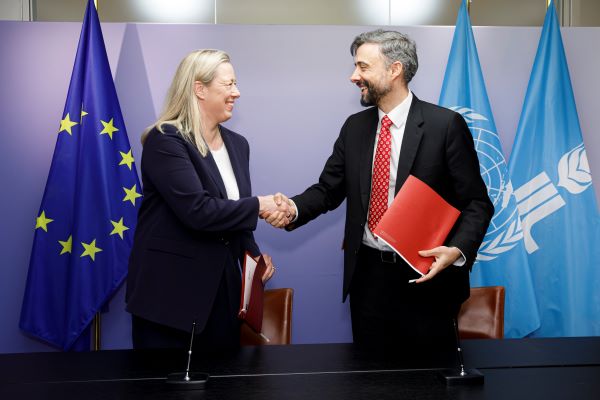With a global food crisis aggravated by the war in Ukraine, the intensification of climate change and many countries at risk of debt distress, Jutta Urpilainen, European Commissioner for International Partnerships, and Alvaro Lario, President of the International Fund for Agricultural Development (IFAD), signed two agreements today for a total of €70.7 million to boost the sustainable production of nutritious and locally grown food and build small-scale farmers’ resilience to climate and economic shocks in Africa, the Caribbean, and the Pacific.
“Global Gateway, the EU’s positive offer, is an investment in the strategic autonomy of our partner countries. We want to support them to build their food systems through sustainable production for better resilience. These funds will enable small-scale producers to feed their families and communities sustainably,” said Urpilainen.
Small-scale farmers produce one third of the world’s food and up to 70 percent of the food in low- and middle-income countries. With the global prices of energy and food reaching unprecedented levels particularly since the start of the war in Ukraine, food inflation has been high in many countries. In addition, small-scale farmers are heavily impacted by climate change and are often those most affected by more frequent and intense extreme weather events.
“Investing in building productive, sustainable and resilient local food systems is a necessary condition to reach long-term sustainable food security” said Lario. “We must invest to enable small-scale producers to feed their families and nations sustainably, have access to finance and productive resources, adapt to climate change, and build shorter and local food value chains.”
The European Union is providing €52.5 million to IFAD as part of the Investing in Livelihood Resilience and Soil Health in ACP countries programme. It will promote agroecology and sustainable agricultural practices aimed at improving and sustaining soil fertility, a more efficient use of synthetic and organic fertilizers, sustainable water management to ensure soils make full use of nutrients, the production of local bio-fertilizers, the use of biodigesters, and small-scale producers’ access to inputs tailored to local agroecological conditions. Activities will be implemented in Ethiopia, Liberia, Malawi, Mali and Niger, with other countries potentially to be added over time.
The European Union is also providing an €18.2 million grant for the Global Programme for Small-scale Agroecology Producers and Sustainable Food Systems Transformation. The Kingdom of Belgium is providing an addition €5 million. The programme will scale-up agroecology practices and help small-scale farmers through better access to knowledge, support services, technologies and market outlets.
According to the Intergovernmental Panel on Climate Change (IPCC), extreme weather events will likely increase in frequency and magnitude in the coming years, putting global food systems at increased risk of disruption, with supply shortages and price hikes inevitable with each new crisis. At the same time, ecosystems and soils will be under increasing threats from climate change and depletion from overuse.
Agroecology provides solutions by helping small-scale farmers adapt to climate change, manage natural resources more efficiently, preserve biodiversity and reverse land degradation trends, while providing an alternative to synthetic fertilizers and increasing production.
The number of people facing acute food insecurity soared from 135 million in 2019 to 345 million in 2022. Approximately 828 million people were estimated to be chronically undernourished in 2022 and almost 3.1 billion people could not afford a healthy diet.








